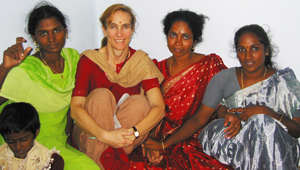Is a More Sustainable Olympics Possible?: Q&A With Maxwell Professor Matthew Huber
Organizers of the 2024 Paris Olympics are committed to creating the most sustainable Games ever—limiting new construction, sourcing local food and using 100% renewable energy, for example. But could a global event with millions of people from all over the…


 While studying the lives of women living with HIV in South Asia, Maxwell School associate professor Cecilia Van Hollen recalls speaking with a young mother in Tamil Nadu, the southeastern state in India. “When neighbors ask me why I am not breastfeeding, I say that my body is weak and that I have no milk. So they don’t ask anymore,” the mother explains.
While studying the lives of women living with HIV in South Asia, Maxwell School associate professor Cecilia Van Hollen recalls speaking with a young mother in Tamil Nadu, the southeastern state in India. “When neighbors ask me why I am not breastfeeding, I say that my body is weak and that I have no milk. So they don’t ask anymore,” the mother explains.